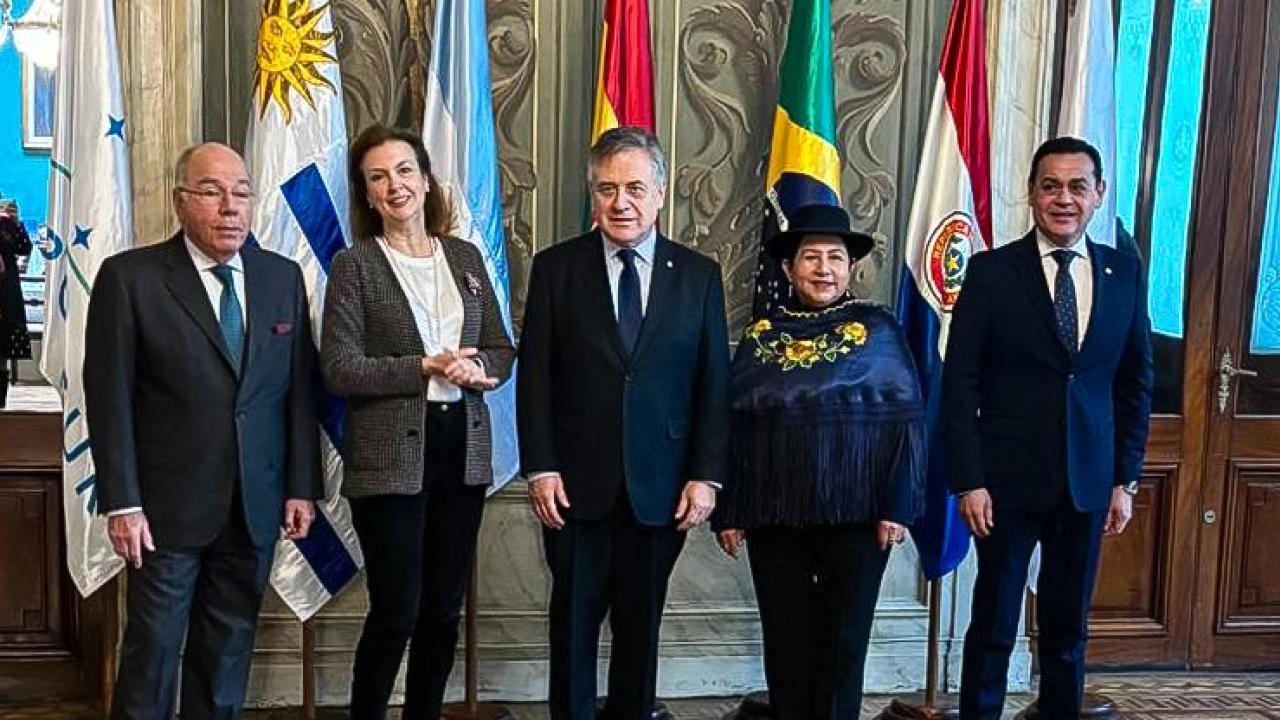
"The meeting of Chief Negotiators to be held in Brasilia this week is a historic opportunity, perhaps one of the last, to move forward in the eventual conclusion of the agreement between MERCOSUR and the EU, which will mark a before and after in the international insertion of the bloc," said the minister.
Today, Foreign Minister Diana Mondino participated in the Meeting of Foreign Ministers of Mercosur in Montevideo, where - among other topics - they discussed the new negotiation modalities proposed by Argentina to advance agreements with other countries and blocs, discussed access to new markets and analyzed the central aspects of the current regional situation in political, social and economic terms.
At the plenary session of Foreign Ministers, Mondino confirmed that “Argentina recognizes the important achievements of MERCOSUR, while taking a critical view of its present and considering that its potential as an expanded market and platform for relations with the world is largely underutilized. At the same time, our country is aware of the sensitivities and interests of some of its partners.”
In this regard, he stressed that “the meeting of Chief Negotiators to be held in Brasilia this week is a historic opportunity, perhaps one of the last to move forward in the eventual closing of the agreement between MERCOSUR and the EU, which will mark a before and after in the international insertion of the bloc.” He added that this will also help to “revitalize the negotiations that are being carried out with the United Arab Emirates, EFTA Dominican Republic, El Salvador, Panama, the Gulf Cooperation Council, Vietnam and Indonesia.”
Mondino was accompanied by her counterparts from Brazil, Mauro Vieira; from Paraguay, Rubén Ramírez Lezcano; from Uruguay, Omar Paganini -host of the meeting-; and from the new State Party, Bolivia, the Minister of Foreign Affairs, Celinda Sosa. The Minister was also accompanied by the Secretary of International Economic Relations of the Ministry of Foreign Affairs, Ambassador Marcelo Cima.
“In recent years, MERCOSUR has not managed to become an instrument for access to large external markets, in addition to a Common External Tariff that is high by international standards. Argentina therefore proposes that those members of the bloc willing to open new markets be allowed to begin negotiations individually or plurilaterally. We have drawn up a proposal for the sequential application of different, more flexible negotiation modalities with third countries or groups of countries,” he said.
The Minister explained: “Our intention is that if during a period of time (two meetings of the Common Market Group) no agreement is reached to negotiate jointly, negotiations can be initiated under this third modality, and the Agreements that are signed will be open to the adhesion of the other States Parties.”
The Argentine Foreign Minister also stressed that “our region is home to one of the largest reserves of biodiversity on the planet, which imposes on us an unavoidable responsibility in preserving this natural heritage. Our countries, due to their extensive territories with low levels of pollution and a relatively low population density, capture more carbon than they emit.”
“Environmental protection should not become an excuse for trade protectionism. Unilateral measures that restrict trade can undermine multilateral efforts and generate distortions in market access. It is possible and necessary to position MERCOSUR countries as exporters of agri-food products that ensure traceability and compliance with current market standards. Argentina agrees with Uruguay in building a common vision of MERCOSUR in terms of trade and sustainability,” he said.
Foreign Minister Diana Mondino stressed that “it is imperative to work together to promote fair international trade, based on clear and transparent rules, and that it is necessary to present ourselves as a model of regional integration that demonstrates that it is possible to reconcile economic growth with environmental protection and social development.”









